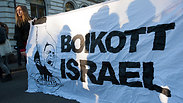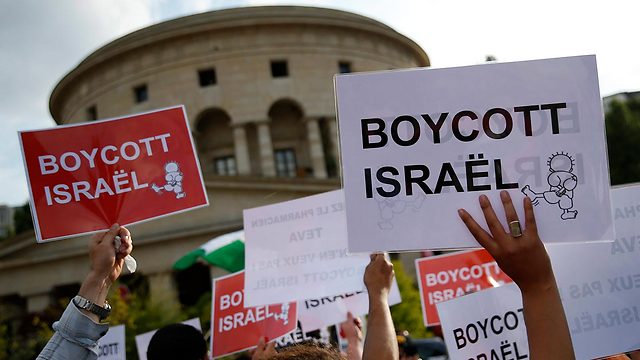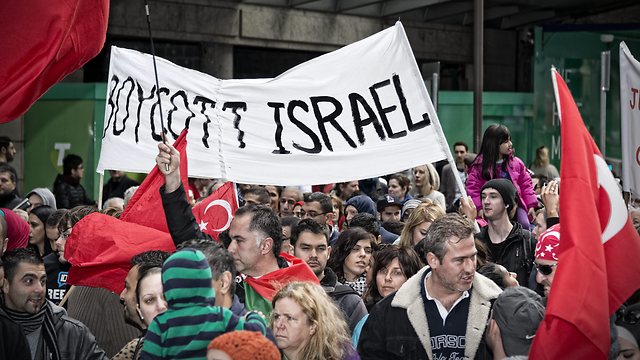
Is BDS such a bad thing?
Op-ed: The boycott movement is greatly feared and hated in Israel, but what does it really look like, and what would its victory really mean for Israel?
There is a tendency to sometimes adopt an aggregative and erroneous attitude towards BDS, the famous anti-Israel boycott movement. First, we should make it clear that BDS is mostly an American movement, with a much smaller representation in Europe, especially in England.
Unlike product labeling, it is not led by governments and parliaments, but largely by students, academics and intellectuals. The movement is supported by famous members of the public, such as Stephen Hawking, Noam Chomsky, many artists (the most maligned of them being Roger Waters), lecturers and academic organizations, labor organizations, national pension funds and others. It is also aided by, and even led tactically and strategically by, Palestinian officials.
BDS opposes the Israeli occupation in all of the territories, including Jerusalem and the Golan Heights, supports the right of return for all diaspora Palestinians, and full civil rights and equality for Israel's Arab citizens. It is impossible to ignore the fact that a large part of the organizers of BDS and its supporters hate Israel, either its very existence or because of its actions in the occupied territories.
But to conduct a genuine debate when it comes to the BDS movement, we must first remove the thick toxic smokescreen that the government has skillfully spread. This smokescreen has caused the confusion of concepts, the distortion of boundaries between areas of discourse, and incitement, so much so that it's difficult to understand which enemy focuses on what matter.
It is important to know that there is no similarity between the demands regarding marking settlement products and the boycott movement. On the contrary, there is a fundamental difference.
Almost all European countries oppose the boycott, and some even have laws prohibiting it. All they say is that occupied territories are not a part of Israel. They want to encourage cooperation and trade with Israel, as well as maintain joint funds and promote scientific research, but they oppose the occupation and oppression.
The conceptual and symbolic separation between Israel and the territories allows Israel's supporters to support it, invest in it, and strengthen their ties with the Jewish nation, knowing that their investments are not directed to empowering the occupation. That explains why the Netanyahu administration and its supporters want to distort the difference.
Another argument is that BDS and product marking stem from anti-Semitic motives. This implies that if the Palestinians were occupied and oppressed by Buddhists and not Jews, the world would sit satisfied and quiet and support it. A similar argument to the one that says terrorists are out to kill us just because we are Jews. Here as well, it's clear that governmental interest is to increase the public's sense of fear.
It seems to me that the main questions we need to worry about as Israelis are different than these. Will the boycott movement, which is growing, eventually win? And more importantly, would its victory be a good or bad thing? Because what should a person support if they believe that the continuation of the situation as it is would be disastrous for us, our children, and our grandchildren?
What should a person do if they believe that Israel could not exist without standing firmly on its two legs of power and justice, and that occupation and oppression are cutting these two legs off from under it? And what should those who don't wish to flee this place, but want instead to see their children and grandchildren grow up here, believe?
The current situation, in which the two peoples are fighting each other and shedding each other's blood, can’t go on forever. So there is a possibility of changing the situation the Bosnian way: Two peoples are fighting for the same plot of land. Hundreds of years of hostilities, atrocities on both sides, and abysmal despair.
Only when the number of fatalities had passed the 100,000 mark and two million people had been displaced did both sides agree on conditions and on an internationally-mediated compromise. Another possibility is a civil war: Maybe someone who believes in the two-state solution will come to power and declare the end of the occupation. In this case, it's safe to assume that a significant portion of the military will rebel and a bloody civil war will commence.
Another option is what happened in Kosovo: International military forces invade Israel and impose order by force. But it is doubtful that the nations of the world will send their sons to get killed here.
And another option is the South African model: Total embargo on both sides, Israelis and Palestinians. When people are forced to stand in line for hours to get baby formula, make do with three hours of electricity a day, and substitute the paralyzed fighter planes with sticks and stones, maybe a majority on both sides will agree to a compromise. Israelis will settle at 75 percent of the ancestral homeland, and the Palestinians will waive the right of return.
So perhaps this should be the solution: A total embargo on both sides, which will force both peoples to come to a compromise, and will prevent casualties, poverty, and suffering.












